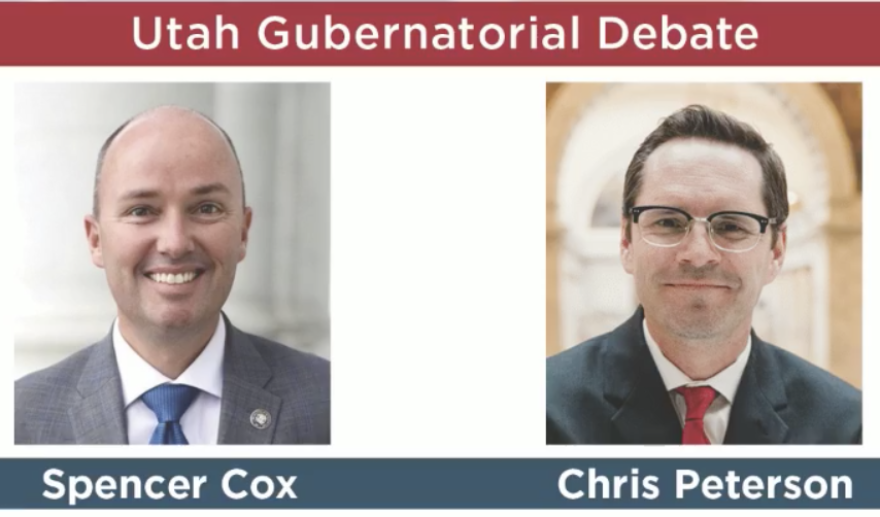The Utah Debate Commission held its gubernatorial debate between Democrat Chris Peterson and Republican Lt. Governor Spencer Cox Tuesday night. The debate was a largely cordial affair but there were still some stark differences between the candidates.
Although Chris Peterson and Lt. Governor Spencer Cox managed to agree on a number of issues in Tuesday’s gubernatorial debate, education amid the COVID-19 pandemic was not one of them.
Both Peterson and Cox agreed on the importance of in-person education but Peterson said he would have adopted a more cautious approach if he were in charge, prioritizing the needs of younger children and their parents.
“I think that we need to go cautiously,” Peterson said. “I recognize that we need to have some schools open because kids need to get that education, parents need them to go back to school in order to have childcare. I think that if I had been in charge, I would have worked with the education authorities to try to increase a little more gradually, try to focus on the youngest kids first because they’re the ones that have the hardest time with distance learning, and also seem to have the best immune response to the disease.”
Utah’s current spike in COVID-19 cases has been largely driven by the 15-24 year old demographic but Cox took a decidedly more uncompromising stance on the issue and countered that in-person learning is essential at all ages.
“The coronavirus is absolutely important, and we are taking it very seriously, but the repercussions of not having kids in school can be just as significant and maybe even worse in some cases,” Cox claimed. “In fact, many of our students are being left behind, especially those in low income areas, students with disabilities. The Salt Lake City School District is the only school district in the state that has not gone back to in-person learning and that’s a huge mistake, it is damaging our kids and that needs to change right now.”
Cox added a hybrid model of part-time classroom learning, which is already being used in several parts of the state, including Park City, could be used to provide more opportunities for social distancing if an outbreak in schools did occur.
Peterson is a University of Utah law professor and is looking to be the first Utah Democrat since 1980 to be elected to the Governorship. Cox has served as Governor Gary Herbert’s Lieutenant since 2013 and beat out an extremely competitive field for the Republican nomination in a primary this June.
Peterson has been critical of the state’s response to the COVID-19 pandemic, which Cox helps lead, and is calling for a statewide mask mandate with reasonable exceptions as the best way to get the pandemic under control.
Herbert and Cox have repeatedly resisted a statewide mask order, preferring those decisions be made by local authorities. Cox said he supports Governor Herbert’s efforts and touted the state’s low COVID-19 death rate and economy amid the pandemic as evidence of the state’s success.
Taxation and the source of the state’s education funding was another point of contention between the candidates.
Both Peterson and Cox agreed more needs to be done to fund education in Utah. According to the U.S. Census Bureau, Utah ranks dead last in the nation in per-pupil spending.
According to the most recent data, Utah spent only $7,628 per student in 2018. By comparison, number-one-ranked New York state spent over $24,000 per student.
Cox argued the problem in Utah stems in part from disparities in property tax revenue between rural parts of the state and more wealthy ones, including Park City.
“We have an equity problem here in the state of Utah and we have to address that,” said Cox. “We have to make sure the kids in rural Utah, as well as the west side of the Salt Lake Valley, get the same opportunities, the same education as kids in Park City.”
Peterson agreed there are equity issues in some parts of the state but argued Utah’s per-pupil funding for education is actually fairly equal statewide. He said that number could be much higher if Utah’s tax code better reflected a priority of public education.
“We’ve got to make sure we do a better job of watching those tax loopholes, tax credits, and tax incentives which account for about 30% of the source of revenue that we are not collecting in our coffers,” Peterson said. “We need to make sure that those tax incentives, dollar-for-dollar, reflect our values in comparison to what we could have spent on public schools.”
In the most recent polling by the Utah Debate Commission, Cox holds a commanding advantage of over 35 points over Peterson among likely voters, 55% to 19.6%. The poll was conducted between Aug. 31-Sept. 12 and has a margin of error of 4.38%.
A link to the entire debate can be found here.


